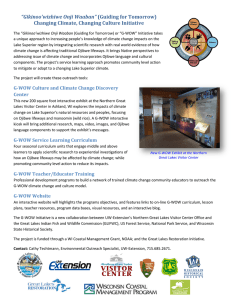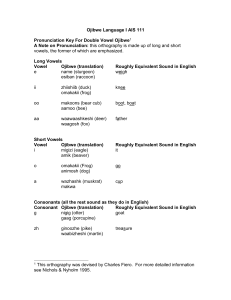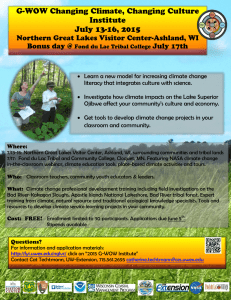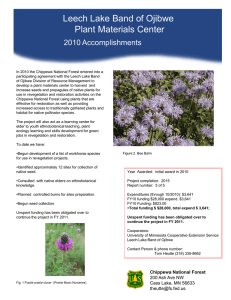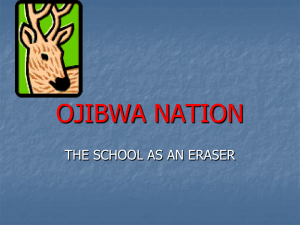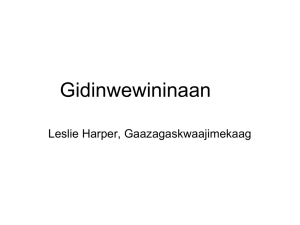Gikinoo’wizhiwe Onji Waaban “Guiding for Tomorrow” or “G-WOW” Changing Climate, Changing Culture Initiative
advertisement
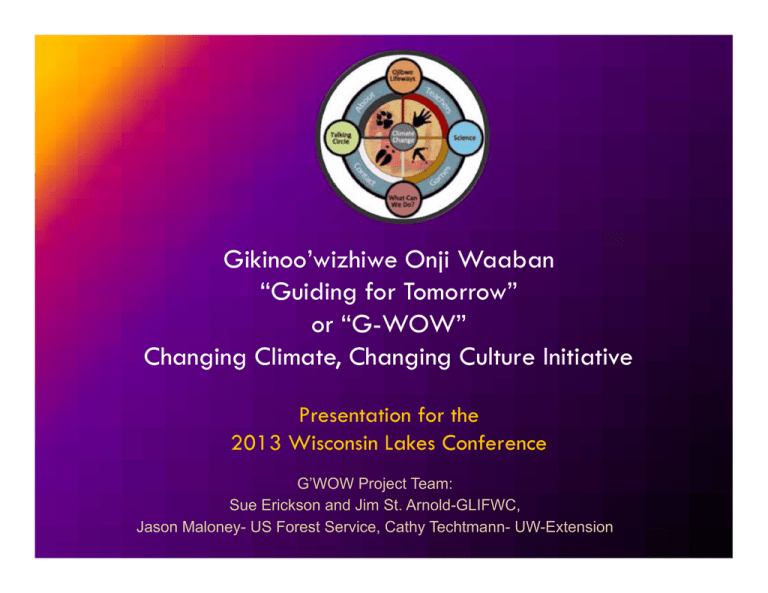
Gikinoo’wizhiwe Onji Waaban “Guiding for Tomorrow” or “G-WOW” Changing Climate, Changing Culture Initiative Presentation for the 2013 Wisconsin Lakes Conference G’WOW Project Team: Sue Erickson and Jim St. Arnold-GLIFWC, Jason Maloney- US Forest Service, Cathy Techtmann- UW-Extension G-WOW Project Partners Primary Funding Provided by: With additional funding from UW-Extension, the National Park Service and the US Forest Service Additional technical support and resources “…local, place-based evidence of climate change gained through experiential learning is as, or more effective than, simply studying analytical climate change data to increasing climate change literacy.” “The Psychology of Climate Change Communication”, Columbia University 2009. Project Roots • • • Increasing evidence that climate change is affecting the sustainability of Lake Superior coastal resources, communities, and cultures. Creating a new climate literacy model that integrates place-based Ojibwe traditional ecological knowledge (TEK) with the latest climate science. Opportunity for a new multi-cultural collaboration between project partners to increase climate awareness for people of all cultures. The NGLVC is located in Ashland, WI What is the G-WOW Initiative? Increasing awareness of climate change impacts on the sustainability of Lake Superior’s coastal resources, cultures, and communities by integrating: - Place-based evidence of climate change based on its impact on traditional Lake Superior Ojibwe lifeways. - Climate change scientific research. - Action to address climate change at a community level. Encouraging people to reflect on how climate change impacts their culture and community; and guiding action to address it. Key principles • Climate change is real. • Humans contribute to climate change. • Weather and climate are different. • Climate affects culture. • We can make a difference. Projected change in Wisconsin’s annual average temperatures in degrees F, 1980-2055, Wisconsin Initiative on Climate Change Impacts (WICCI) The G-WOW model is based on understanding how climate change affects the sustainability of a key plant or animal species that an Ojibwe culture practice or “lifeway” depends on. • Links place-based evidence with scientific climate change research • Makes the model transferrable across different cultures The Ojibwe lifeway of wild rice harvesting depends on the sustainability of manoomin. G’WOW Model for Increasing Climate Change Literacy Sharing Results Interactive Blog Taking Action on Knowledge Community level service learning projects Lifeways-Place Based Birch bark harvesting & Maple sugaring Fishing Wild Ricing Respecting Our Culture • • • • Climate Change Science Federal State Tribes • • • Target Audiences Middle school and above level learners including: Students Independent online learning via the G-WOW web curriculum Teacher guided classroom learning Learning via school programs/field experiences at the NGLVC Teachers-Educators Interested in increasing their climate change literacy to support classroom and community climate change education Teacher G-WOW Changing Climate, Changing Culture Institutes Visitors to the NGLVC Approximately 150,000 annual visitors Includes school classes, community members, transient visitors G-WOW outreach components Interactive Climate Change Discovery Center at NGLVC Experiential learning experiences for students & educators Ojibwe language and traditional ecological knowledge Web-Based Service Learning Curriculum Educator-Teacher Training Institutes Multi-cultural perspectives G-WOW Changing Climate, Changing Culture Discovery Center Northern Great Lakes Visitor Center, Ashland WI • Major exhibit featuring place-based evidence of climate change impacts on the sustainability of manoomin and Ojibwe lifeway of wild ricing. • Integrates Ojibwe language, TEK, multi-cultural perspectives. • Applies climate research and climate change observations from other cultures. • Gives local examples of local climate change mitigation activities. Exhibit Panel 1: Food that Grows on the Water Lifeways Threatened Provides background on Ojibwe lifeway of wild ricing and the ecology and cultural importance of the key species, manoomin or “wild rice.” Exhibit Panel 2: Culture and Science Agree Provides placebased evidence of climate change impacts on manoomin. Exhibit Panel 3: The Great Lakes Are Running A Fever Integrates scientific evidence of climate change, future climate projections, and multicultural observations. Exhibit Panel 4: Fighting Climate Change with Change Offers Ojibwe “Seven Generation” teaching and stories of what local people are doing to fight climate change. G’WOW Discovery Center Dedication Ceremony Dedicated 10/11/11 with ceremonies, feast, and attended by over 120 tribal, state/federal agency, and community representatives. Bad River Tribal Elder Joe Rose speaking at G’WOW dedication Bad River Tribal Chairman Mike Wiggins and Nicolet-Chequamegon National Forest Supervisor Paul Strong A traditional feast and dancing followed Photos: Charlie Rasmussen- GLIFWC G-WOW Website www.g-wow.org Major new on-line climate change service learning curriculum G’WOW web-based curriculum • Expanded to include 4 seasonal Ojibwe cultural lifeways to investigate place-based evidence of climate change impacts on each using videos, web-resources, and experiential learning . • Interactive maps and links to scientific research to investigate climate change impacts on the sustainability of the key species. • Students develop a climate change hypothesis and test it. • Completion of a service learning project to address climate change. • Sharing project results with others via an interactive blog. Ojibwe Lifeway Units Maple Sugaring & Birchbark Harvesting- Sugar Maple & Paper Birch (Spring) Fishing- Cold and Coolwater Fish (Summer) Wild Ricing-Manoomin (Fall) Respecting Our Culture-American Marten (Winter) • Learning objectives for the unit. • Baseline ecological information on the key species(s) the lifeway depends on. • Connects the learner with culture, understanding of the importance of key species to maintaining the Ojibwe lifeway. • Place-based evidence exploring how climate change impacts the key species, the Ojibwe lifeway, and what these change mean for people of all cultures. • Activity Guides guide student investigations. Investigate the Science • Toolbox of options to investigate scientific climate change research, focusing on climate change stressors affecting the key species. • “Test It” : Learners develop their own hypothesis on climate change and test it through a self-designed investigations. • Activity Guides guide student investigations. Projected change in the frequency of 2” precipitation events from 1980-2055, WICCI What Can We Do? • Provides a template for developing a service learning project. • Learners act on knowledge gained to develop a service learning project to address climate change impacts. Talking Circle • Learners reflect on knowledge gained and share results of their service learning project through the “Talking Circle” blog. • Talking Circle projects are automatically uploaded to the G-WOW kiosk. Other G-WOW Website Resources Teacher Resources About Project background Partner acknowledgements G’WOW Curriculum Guide Climate Change Climate literacy basics Contact For more information Games Interactive climate change games Take a Test Drive Teacher-Educator Professional Development 2012 “G-WOW Changing Climate, Changing Culture” 4-day Institute. In-depth climate change core competency and G-WOW model training. Offered by UW-Extension, AINL-NPS, GLIFWC, USFS, NGLVC. Location: Apostle Island National Lakeshore, Bad River, and NGLVC. • 25 teacher participants. • 900 training hours. Credit available. • 83% of the educators who attended the used the knowledge gained to engage their classes in climate mitigation projects. • 400 students participated in climate change service learning projects. 2013 G-WOW Changing Climate, Changing Culture Teacher Institute, July 15-18. SAVE THE DATES! "When I saw that we would be teaching about climate change this fall, I thought Ugghhh!!! Now I see that the cultural impact of climate change is how to approach middle school kids with this topic. I am anxious to bring kids up from central Wisconsin to see how climate change is impacting this region.“ - a teacher from Marathon, WI G’WOW Discovery Center Interactive Kiosk • 32-inch interactive touch screen kiosk • Installed at the NGLVC: 3/31/13 The kiosk features the G-WOW curriculum in a condensed, interactive format. The Science icon opens an interactive map were time periods, environmental variables and climate futures can be manipulated to investigate projected climate change impacts. The “What Can We Do” icon provides practical tips for fighting climate change and gives examples of community climate change projects posted to the GWOW website. The kiosk includes videos, many interactive tools, and games! Let’s Play “CLIMATE QUIZ” Ripples • Expanding the G-WOW model throughout Ojibwe Ceded Territory via tribal colleges. • Partnering with climate change education centers to integrate the G-WOW model including the: • • • Will Steger Foundation, Aldo Leopold Center-Menona, WI CYCLES-Teachers Discovering Climate Change Through Native Perspectives, University of MN • Outreaching the G-WOW model statewide as a method of increasing climate change literacy to people of all cultures. The G-WOW Initiative has been chosen for an Honor Award from the Eastern Region of the US Forest Service, submitted for a USFS National Award Featured in the Wisconsin Natural Resources Magazine Do Culture and Science Agree? Is climate change affecting your culture, lake, or community? You Be the Judge! www.g-wow.org Miigwech ! Thank you! For more information, please contact Cathy Techtmann-Environmental Outreach State Specialist UW-Extension 715.561.2695 catherine.techtmann@ces.uwex.edu
